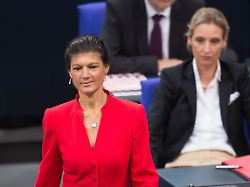RTL/ntv trend barometer
AfD loses, Wagenknecht already at FDP level
January 23, 2024, 12:01 p.m
Listen to article
This audio version was artificially generated. More info | Send feedback
After a dubious meeting between AfD officials and right-wing activists became known, the party fell more clearly than in a long time in the RTL/ntv trend barometer. The new Wagenknecht party is competitive straight away. The Chancellor continues to fall in reputation.
After a network meeting between AfD officials with entrepreneurs and new-right activists became known, the AfD lost two points in the RTL/ntv trend barometer within a week for the first time in the current legislative period. At the same time, as part of the Sunday question, the Forsa Institute asked for the first time nationwide approval of the recently founded Alliance Sahra Wagenknecht party (BSW), which is holding its first party conference on Saturday in Berlin. With three percent approval, the BWW is immediately on a par with the Free Voters and only one percentage point behind the FDP and the Left Party.
In addition to the AfD and BSW, the trend barometer only shows movement for one party: the SPD gained one point compared to the previous week. If the Bundestag were to be elected this week, the parties could therefore expect the following result: CDU/CSU 31 percent (federal election in September 2021: 24.1 percent), AfD 20 percent (10.3 percent), SPD 14 percent (25, 7 percent), Greens 14 percent (14.8 percent), FDP 4 percent (11.5 percent), Left 4 percent (4.9 percent), BSW 3 percent, Free Voters 3 percent (2.4). 7 percent of voters would choose other parties.
Meanwhile, things continue to go downhill for Chancellor Olaf Scholz: If he, CDU leader Friedrich Merz and the Green Economics Minister Robert Habeck competed against each other in a direct election for the chancellorship, the incumbent would only get 13 percent, two points less than the previous week. Merz also lost one point at 25 percent, while Habeck increased from 15 to 17 percent.
If Foreign Minister Annalena Baerbock were to run for the Greens instead of Habeck, she would get one point more than the previous week to 16 percent. Scholz loses one point in this comparison and is also 16 percent, while Merz gains one point in this scenario to 28 percent. He generates almost as much approval as Baerbock and Scholz combined.
The slight upward trend for Habeck and Baerbock is also reflected in the question of the political competence of the parties: Here the Greens can now gain one point with 6 percent. The FDP is now also at 2 percent instead of one percent. Given their 4 percent approval rating on Sunday’s question, the situation remains dangerous for the Free Democrats: They have to worry about entering the Bundestag.
The CDU and CSU would be best able to deal with the problems in Germany, say 17 percent of those surveyed. This is followed by the AfD with another 7 percent and finally the SPD and the Greens with 6 percent each. Other parties were named by 3 percent of those surveyed. 59 percent of those surveyed did not specify a party.
The most important topic of the past week – Forsa surveyed participants from Tuesday to Friday – continued to be the farmers’ protests: 39 percent said that this topic interested them most. This was followed by the federal government with 28 percent, the war in Ukraine with 27 percent, the war in the Middle East with 22 percent and the economic situation with 21 percent.
With a view to the nationwide demonstrations against right-wing extremism and racism at the weekend, Forsa also asked about the most important topics again on Monday. Right-wing extremism and the demonstrations against the AfD were now the most important topics, with 41 percent mentioning them. You can read here next Tuesday how this affects the development of support for the AfD.
The data for the RTL/ntv trend barometer was collected by the market and opinion research institute Forsa on behalf of RTL Deutschland between January 16th and 22nd. Database: 2503 respondents. Statistical margin of error: plus/minus 2.5 percentage points.
Further information about Forsa here.
Forsa surveys commissioned by RTL Deutschland.
